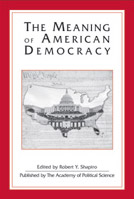
July 25, 2005 · 257 pages
ISBN10: 1-884853-05-6
Paperback: $25.50 (APS Members: $20.40)
| Order: | Paperback |
The Meaning of American Democracy examines recent events that have raised questions about the meaning of democracy, including the elections of 2000 and 2004, the terrorist attacks on September 11, and the wars in Afghanistan and Iraq.
PART I: INTRODUCTION
The Meaning of American Democracy
Robert Y. Shapiro
PART II: DEMOCRACY, INSTITUTIONS, AND RIGHTS
What Political Institutions Does Large-Scale Democracy Require?
Robert A. Dahl
Prescriptions for a New National Democracy
Michael Lind
Shoring Up the Right to Vote for President: A Modest Proposal
Alexander Keyssar
PART III: FROM SEPTEMBER 11 TO IRAQ
American Nationalism and U.S. Foreign Policy from September 11 to the Iraq War
Paul T. McCartney
Deciding on War Against Iraq: Institutional Failures
Louis Fisher
Misperceptions, the Media, and the Iraq War
Steven Kull, Clay Ramsay, and Evan Lewis
Do Detainees Have Constitutional Rights?: Excerpts from Hamdi v. Rumsfeld
Supreme Court of the United States
PART IV: VOTING, ELECTIONS, AND PARTISANSHIP
Polarized Politics and the 2004 Congressional and Presidential Election
Gary C. Jacobson
Why Bush Won the Presidential Election of 2004: Incumbency, Ideology, Terrorism, and Turnout
James E. Campbell
PART V: WHY ELECTIONS ARE NOT ENOUGH
Complications of American Democracy: Elections Are Not Enough
Demetrios Caraley
Join the Academy of Political Science and automatically receive Political Science Quarterly.
Academy Forum | The 2024 Presidential and Congressional Elections: Small Wave, Seismic Effects
WEBINAR
Jimmy Carter's Legacy
Jimmy Carter's Public Policy Ex-Presidency
John Whiteclay Chambers II
Publishing since 1886, PSQ is the most widely read and accessible scholarly journal with distinguished contributors such as: Lisa Anderson, Robert A. Dahl, Samuel P. Huntington, Robert Jervis, Joseph S. Nye, Jr., Theda Skocpol, Woodrow Wilson
view additional issuesArticles | Book reviews
The Academy of Political Science, promotes objective, scholarly analyses of political, social, and economic issues. Through its conferences and publications APS provides analysis and insight into both domestic and foreign policy issues.
With neither an ideological nor a partisan bias, PSQ looks at facts and analyzes data objectively to help readers understand what is really going on in national and world affairs.